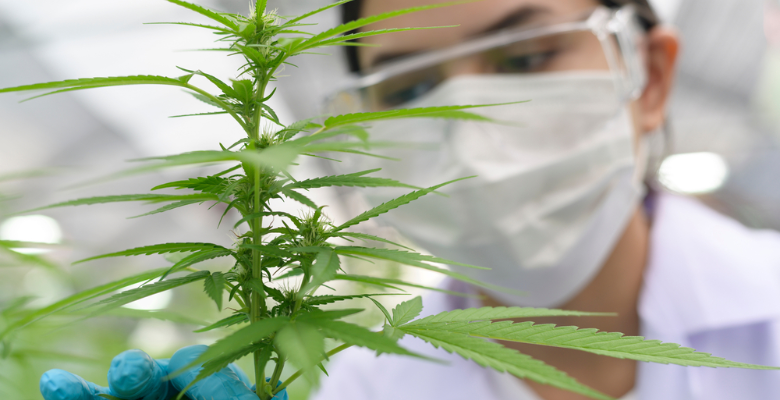Although smoking Cannabis is known for its potential to induce acute psychotic symptoms, a context of medicinal use of cannabinoid derivatives is capable of relieving severe symptoms associated with schizophrenia and other psychoses.
In this content, we will discuss the associations between Cannabis use and schizophrenia, bringing scientific evidence that proves the antipsychotic potential of Cannabidiol (CBD).
Associations between Cannabis use and schizophrenia
The use of Medical Cannabis to treat schizophrenia is still quite controversial, given the social stigmas and the potential negative neuropsychiatric outcomes related to recreational/adult use of the plant. We all know that the abuse of cannabis smoke in individuals genetically predisposed to the development of psychiatric disorders is capable of generating serious problems such as chemical dependence, amotivational syndrome, intellectual deficit, mood disorders, and psychotic disorders.
This transversal study carried out with 109.308 participants makes clear that there is a strong dose-dependent association of recreational Cannabis smoking in genetically susceptible individuals and the occurrence of four types of psychotic experiences: auditory hallucinations, visual hallucinations, persecutory delusions, and delusions of reference.
>>You can read the full research here: Cannabis, schizophrenia genetic risk, and psychotic experiences: a cross-sectional study of 109,308 participants from the UK Biobank.
However, in a context of medicinal, scientific, and methodical use of cannabinoid derivatives, through a safe and assertive prescriptive strategy, the same plant can contribute to the relief of severe symptoms associated with schizophrenia and other psychoses. Several studies attest to the antipsychotic potential of CBD in these conditions.
Speaking of assertive prescriptions, download our guide on how to dosage cannabinoid derivatives and learn more how to improve your prescriptive practice.
An example is this pre-clinical research which indicates that, during peri-adolescence, CBD prevents schizophrenia-like behavioral abnormalities in an animal model of the disease, suggesting involvement of the serotoninergic system in this effect.
The results showed that CBD use in rats during the postnatal period of 30 to 60 days could prevent positive and cognitive symptoms of schizophrenia, considering aspects such as locomotor activity, social interaction, startle inhibition and contextual fear conditioning.
>>You can read the full research here: Cannabidiol Administered During Peri-Adolescence Prevents Behavioral Abnormalities in an Animal Model of Schizophrenia.
Several other pre-clinical and clinical studies confirm the antipsychotic potential of CBD. Check out more in these two excellent papers we have selected for you:
>> Cannabidiol modulation of hippocampal glutamate in early psychosis
>> Cannabidiol (CBD) as a novel treatment in the early phases of psychosis
Cannabis relieves symptoms of schizophrenia
Schizophrenia is considered a highly debilitating neurodevelopmental psychiatric disorder. As conventional pharmacotherapy in relation to the disease is problematic and has not shown great advances in recent years. The medical Cannabis has stood out as a promising alternative in this scenario, as pointed out by scientific research in the area.
The use of CBD in symptom relief
The most recent studies investigate the potential of CBD in relieving the symptoms of schizophrenia, for example this review which brings together research conducted with schizophrenia patients in subacute psychotic syndromes, patients in high-risk clinical status for psychosis (CHR-P), frequent users of smoking Cannabis, and patients with chronic schizophrenia.
Although results are still preliminary, studies indicate that the cannabidiol assists in relieving positive and cognitive symptoms of chronic schizophrenia, although there is no evidence for reducing negative symptoms.
As for the occurrence of adverse effects, the research included in this review suggested good tolerability of CBD, even at high doses.
>>You can read the full research here: Cannabidiol as a treatment option for schizophrenia: recent evidence and current studies.
The results of this randomized, double-blind, controlled clinical trial also show that, in comparison with the conventional antipsychotic amisulpride, the CBD demonstrated similar efficacy in reducing psychotic symptoms in patients suffering from schizophrenia, but with fewer side effects, confirming the good tolerability of this medication by patients.
>> You can read the full text of the research at:: Cannabidiol enhances anandamide signaling and alleviates psychotic symptoms of schizophrenia
We also point out this other double-blind clinical study of a parallel group study in which patients with schizophrenia were randomized in a 1:1 ratio to receive CBD (1000 mg/dia) or placebo, along with conventional antipsychotic medication.
Participants were assessed before and after treatment using the Positive and Negative Syndrome Scale (PANSS), the Brief Assessment of Cognition in Schizophrenia (BACS), the Global Assessment of Functioning Scale (GAF), and the Clinical Global Impression Improvement and Severity scales (CGI-I and CGI-S).
The results showed that, after six weeks of treatment, the CBD group showed lower levels of positive psychotic symptoms compared to the placebo group. The substance was well tolerated, with similar rates of adverse events between the patient groups.
>>You can read the full research here: Cannabidiol (CBD) as an Adjunctive Therapy in Schizophrenia: A Multicenter Randomized Controlled Trial.
An assertive prescription context for cannabinoid derivatives can bring therapeutic benefits in severe, refractory, and disabling illnesses such as schizophrenia. Therefore, technical knowledge and Specialized education in the area are crucial to potentiate results and avoid adverse effects.
The WeCann Academy is committed to your learning journey through the International Certification in Endocannabinoid Medicine, exclusive to medical professionals.
We connect experts from around the world in a global community of Endocannabinoid System research and studies to bridge scientific knowledge and practical experience in the medical use of Cannabis.
Would you like to join us? Contact us and get ready for this new frontier of Medicine!
References
McGuire P, Robson P, Cubala WJ, Vasile D, Morrison PD, Barron R, Taylor A, Wright S. Cannabidiol (CBD) as an Adjunctive Therapy in Schizophrenia: A Multicenter Randomized Controlled Trial. Am J Psychiatry. 2018.
Peres FF, Diana MC, Levin R, Suiama MA, Almeida V, Vendramini AM, Santos CM, Zuardi AW, Hallak JEC, Crippa JA, Abílio VC. Cannabidiol Administered During Peri-Adolescence Prevents Behavioral Abnormalities in an Animal Model of Schizophrenia. Front Pharmacol. 2018.
Schoevers J, Leweke JE, Leweke FM. Cannabidiol as a treatment option for schizophrenia: recent evidence and current studies. Curr Opin Psychiatry. 2020.
Wainberg M, Jacobs GR, di Forti M, Tripathy SJ. Cannabis, schizophrenia genetic risk, and psychotic experiences: a cross-sectional study of 109,308 participants from the UK Biobank. Transl Psychiatry. 2021.




